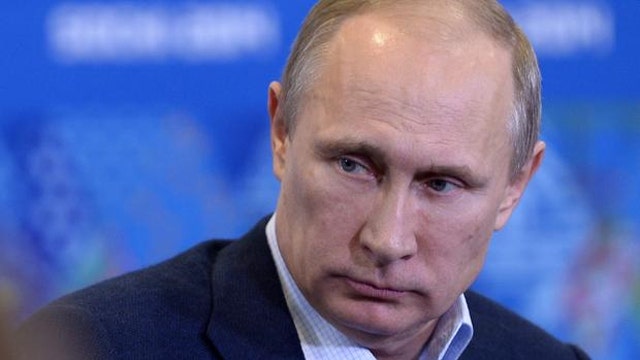The U.S. and its allies announced Monday that they would, for now, exclude Russia from the G8 and boycott a planned summit in Sochi in retaliation over its Crimea takeover -- though Russia's government shrugged off the latest efforts to isolate the country.
Russian Foreign Minister Sergei Lavrov, on the sidelines of a nuclear security summit at The Hague, reportedly said it would not be a "big problem" if the G8 does not convene.
"If our western partners believe the format has exhausted itself, we don't cling to this format," he said, according to Reuters. He spoke as all members of the G8 group except for Russia -- known as the G7 -- met at The Hague on Monday to strategize over Moscow's aggression against Ukraine, amid concerns about a Russian troop buildup.
In a joint statement following that meeting, the leaders of the G7 nations warned that Russia's actions "will have significant consequences" and that they "remain ready to intensify actions ... that will have an increasingly significant impact on the Russian economy, if Russia continues to escalate this situation."
The statement announced that the G7 nations would not go to Sochi in June, and said they would "suspend" participation in the G8 "until Russia changes course and the environment comes back to where the G-8 is able to have a meaningful discussion." They said the June meeting would be held in Brussels instead of Sochi.
Though Russia so far has absorbed targeted sanctions imposed by the United States and European Union over Crimea, western leaders are urging Moscow not to make any further advances. President Obama, who began a tour of European cities on Monday with his meetings at The Hague, last week threatened to impose broad economic sanctions on Russia if the country does not stand down.
Secretary of State John Kerry met for a little over an hour with Lavrov in The Netherlands, and once again urged Russia to "de-escalate the situation."
According to State Department spokeswoman Marie Harf, Kerry voiced concern about the "massing of a large number of Russian forces on the border and of the treatment of Ukrainian military forces, including many Ukrainian servicemembers who are missing."
She also reiterated that the U.S. is "not going to Sochi" for the previously scheduled summit.
The warnings about further Russian incursions into Ukraine have mounted as Ukrainian officials say Moscow may be preparing for an attack.
Lavrov met for the first time Monday with his Ukrainian counterpart to discuss the crisis. Before the meeting, Ukrainian Foreign Minister Andriy Deshchytsia said the Ukrainian government has remained concerned about a Russian military buildup near Ukraine's border.
"The possibility of a military invasion is very high. We are very much worried about this concentration of troops on our eastern border," he said.
Meanwhile, ending days of wavering, Ukraine's fledgling government also ordered troops to pull back Monday from Crimea itself.
Putin's government moved with startling swiftness in annexing Ukraine's Crimean Peninsula last week following a referendum which the U.S. and other western governments decried as illegitimate. The U.S. and European Union have moved forward with modest sanctions, largely focused on individuals, but those efforts have not tempered the Russian government's advances.
According to AFP, Ukrainian leaders voiced concern that Putin could move beyond Crimea.
"The aim of Putin is not Crimea but all of Ukraine... His troops massed at the border are ready to attack at any moment," National Security and Defence Council chief Andriy Parubiy reportedly told a crowd in Kiev.
Obama began his high-stakes tour through Europe with Russia at the top of the agenda.
"We're united in imposing a cost on Russia for its actions so far," Obama said after meeting with Dutch Prime Minister Mark Rutte.
Officially, nuclear terrorism is the main topic for world leaders at the summit -- the third since Obama launched the series in 2009. It opened with Japan announcing it would turn over to the U.S. more than 700 pounds of weapons-grade plutonium and a supply of highly-enriched uranium, a victory for Obama's efforts to secure nuclear materials around the world.
But in another sign of how the Ukraine crisis was overshadowing diplomacy on other fronts, Putin declined to attend, sending his foreign minister instead.
Rutte said Russia's attempts to annex Crimea are "a flagrant breach" of international law. "The presence of so many international leaders in the Netherlands this week presents an important opportunity for the international community to discuss this subject as well as other pressing issues that affect our common interest," Rutte said.
Obama also met Monday with Chinese President Xi Jinping. On Tuesday, Obama has planned a joint meeting with Japanese Prime Minister Shinzo Abe and South Korean President Park Geun-hye, a session preceded by a sitdown with Prince Mohamed bin Zayed, crown prince of Abu Dhabi, the richest emirate in the United Arab Emirates federation.
The two-day nuclear summit was the long-scheduled draw for Obama's visit to The Netherlands, but the headline event Monday was a Ukraine-focused, hurriedly scheduled meeting of the Group of Seven industrialized economies -- the U.S., Britain, Canada, France, Germany, Italy and Japan.
Discussion among Obama and his G7 counterparts centered on economic aid to Ukraine, while at the same time seeking to segregate Putin from the exclusive group, which Russia usually joins in Group of Eight meetings.
The Associated Press contributed to this report.











































